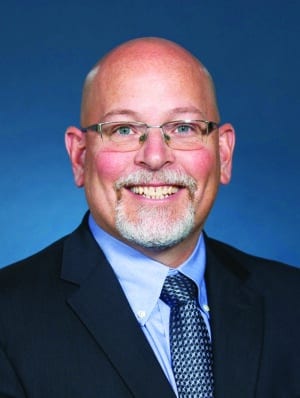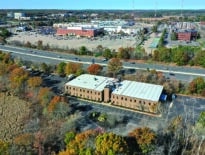Christopher Hendry
President and CEO, IC Federal Credit Union
Age: 52
Industry experience: 6 years
A year ago, Christopher Hendry had no idea he would soon start a career in the credit union industry, never mind as a president and CEO. Hendry had spent 27 years working in philanthropy, first at social services agencies and state universities and then at UMass Memorial Health – HealthAlliance-Clinton Hospital, where he said he was “perfectly happy” in his role as senior director of external affairs.
Hendry had spent two years on the supervisory committee of Fitchburg-based IC Federal Credit union and then another four years as a board member. Earlier this year, that board appointed him as the credit union’s next president and CEO.
Q: How did the opportunity come about to be IC Federal Credit Union’s president and CEO?
A: We went through a transition with our CEO a year ago in June, and at the time, the board took the opportunity to really step back and decide what we wanted in our next CEO. We started talking about a lot of things that I actually do already – the community involvement, the marketing, the building relationships, and, more importantly, the leading of teams. I was pleasantly surprised when, as a board member, they turned to me and said, “Would you consider this?” It was an opportunity for me to lead an organization on my own, but it really was an opportunity to take my skill set and what I hope is my expertise and bring it into an organization to impact change.
I certainly had concerns coming into this: Do I really think I can be a CEO and president of a financial institution when that isn’t my background? At the end of the day, it’s the confidence in knowing that you have enough of the resources and the ability to do what needs to be done, surround yourself with a smart and challenging team, and run the organization the way that you would want the organization run.
Q: What are some of your goals for IC Federal Credit Union?
A: I would say increasing awareness and/or reintroducing us to the community. We’re a 93-year-old organization, but I’m not sure that the community understands all that we have to offer. As an example, we’ve had a commercial lending program for the last five years. I’m not sure that the community knows we have a commercial lending program, and I’m not sure that even if they did, we come top of mind. So, it’s really trying to reintroduce ourselves to the community, broaden the relationships that we should have and re-energize some of the relationships that we do have. That’s where my community background has come into play. I’ve been in the North Central Massachusetts community for the better part of 20 years. I know a lot of the organizations in the region. Now I’m in a position where, through the credit union, we have the opportunity to impact the community.
Q: What are some of the advantages and challenges of the credit union’s size?
A: We fluctuate between $560 million and $580 million in assets, which means we are not a small credit union at all, except when you start comparing us to Metro or Jeanne D’Arc or Workers or DCU. But out of the 120-plus credit unions in the state, we’re in the top 25, so it gives us some advantages that we are larger than a lot of others. But there are disadvantages. From a resource standpoint, we have to make really tight decisions, even from a staffing standpoint. We have about 110 employees, so it doesn’t give you as much depth in areas all the time that you need. We’re lean, but it’s about how can we make strategic growth that is acceptable for our members and makes sense to us. We know what our sweet spot is, and we want to build off that.
Q: What is that sweet spot?
A: Our core market really is North Central Massachusetts. We’ve got seven branches, five of which are in North Central Massachusetts. I always like to say, with 33,500 members and five branches in our backyard, we ought to be mining what we know, and we ought to make sure that we have all of that buttoned up before we think we can grow. We do have a branch in Worcester, we do have a branch in Marlborough. Both of those are highly competitive regions, and we have to decide how we play in those regions, because we can’t just dip our toe into the market and think we’re going to be successful.
Q: What are some opportunities and some challenges in the market?
A: For us to be able to focus on diversity, equity and inclusion is certainly an area we can improve on, and it’s one that I believe is an opportunity as well. We need to address it authentically. I know everybody is focusing on DE&I right now, but we’re credit unions, and credit unions are known to work with their communities. We have a very diverse community, and we need to do a better job of representing that community, being in that community, looking like that community, sounding like that community and just really being authentic about wanting to be a part of what’s going on in our backyard.
Q: Coming from the board, is there anything about the credit union that has surprised you?
A: There’s certainly a lot more complication in regulation involved in the credit union than we as board members would generally get into. When you’re a board member, you tend to fly at a little bit higher level – let’s say we’re flying at 60,000 feet. What I’ve appreciated is the talent that we have here at the organization – and the dedication. We have so many employees who have been here 10, 20-plus years and so many employees who stepped up during the pandemic to make sure that our members had the opportunity to receive everything that they should when they entrust us with their money. As a board, you’re not dealing with it on a day-to-day basis, and it was wonderful to see.
Hendry’s Five Favorite Outdoor Activities
- Golfing
- Skiing
- Cycling
- Visiting the southeast coast of Maine
- Snowshoeing







